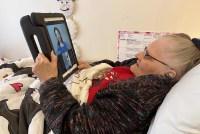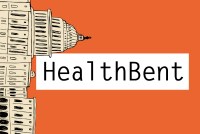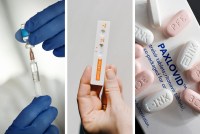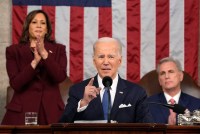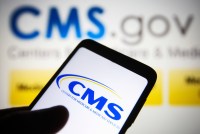Latest KFF Health News Stories
Mental Health Care by Video Fills Gaps in Rural Nursing Homes
In-person mental health care is hard to arrange in rural nursing homes, so video chats with faraway professionals are filling the gap.
What the Health? From KFF Health News: Judging the Abortion Pill
Any day now a conservative federal judge in Texas could upend the national abortion debate by requiring the FDA to rescind its approval of mifepristone, a drug approved in the U.S. more than 20 years ago that is now used in more than half of abortions nationwide. Meanwhile, a controversial study on masks gets a clarification, although it may be too late to change the public impression of what it found. Alice Miranda Ollstein of Politico, Jessie Hellmann of CQ Roll Call, and Sarah Karlin-Smith of the Pink Sheet join KHN chief Washington correspondent Julie Rovner to discuss these issues and more. Plus, for “extra credit,” the panelists suggest health policy stories they read this week they think you should read, too.
What the Health? From KFF Health News: Biden Budget Touches All the Bases
Very little in the proposed budget released by the Biden administration is likely to become law, particularly with Republicans in charge of the U.S. House. Still, the document is an important statement of the president’s policy priorities, and it’s clear health programs are among those he feels are important. Meanwhile, five women who were denied abortions when their pregnancies threatened their lives are suing Texas. Shefali Luthra of The 19th, Victoria Knight of Axios, and Margot Sanger-Katz of The New York Times join KHN’s Julie Rovner to discuss these issues and more. Also this week, Rovner interviews Harris Meyer, who reported and wrote the two latest KHN-NPR “Bill of the Month” features. Both were about families facing unexpected bills following childbirth.
For Young People on Medicare, a Hysterectomy Sometimes Is More Affordable Than Birth Control
While Medicare was designed as health insurance for those 65 and older, it also covers people with disabilities who are young enough to still get pregnant. Yet they often struggle to get their birth control covered and end up with large medical bills — or instead opt for hysterectomies or tubal ligations, which Medicare sometimes will cover.
Covid Aid Papered Over Colorado Hospital’s Financial Shortcomings
Financial pitfalls at the nation’s highest-elevation hospital serve as a cautionary tale as rural hospitals emerge from the pandemic on shaky ground.
Struggling to Survive, the First Rural Hospitals Line Up for New Federal Lifeline
Hospitals in New Mexico, Texas, and Oklahoma are among the first to apply for a new rural hospital payment model that shifts the focus of services away from overnight stays to outpatient and emergency care. Still, experts say the law needs to be amended to provide the right mix of care for rural communities.
What the Health? From KFF Health News: March Medicaid Madness
President Joe Biden and Republicans in Congress spent last month sparring over whether to shield Medicare and Social Security from budget cuts — leading some to wonder if Medicaid was on the table instead. Biden and Democrats say no, but some Republicans seem eager to trim federal spending on the health program for Americans with low incomes. And ready or not, artificial intelligence is coming to medical care. Benefits, as well as unintended consequences, are likely. Alice Miranda Ollstein of Politico, Rachel Cohrs of STAT News, and Lauren Weber of The Washington Post join KHN’s chief Washington correspondent, Julie Rovner, to discuss these issues and more.
Readers and Tweeters Urgently Plea for a Proper ‘Role’ Call in the ER
KHN gives readers a chance to comment on a recent batch of stories.
What the Health? From KFF Health News: Senators Have Mental Health Crises, Too
When U.S. Sen. John Fetterman of Pennsylvania checked himself into the Walter Reed National Military Medical Center for treatment of depression this month, he got an unusual reaction from his colleagues in Congress: compassion. It’s a far cry from how politicians once kept their mental health issues under wraps at all costs. Meanwhile, GOP presidential candidate Nikki Haley is stirring up controversy by proposing that all politicians over age 75 be required to pass a mental competency test to hold office. Joanne Kenen of the Johns Hopkins Bloomberg School of Public Health and Politico, Sarah Karlin-Smith of the Pink Sheet, and Rachel Roubein of The Washington Post join KHN chief Washington correspondent Julie Rovner to discuss these issues and more. Plus, for “extra credit,” the panelists suggest health policy stories they read this week that they think you should read, too.
Proposed Medicare Advantage Changes Cannot Accurately Be Called ‘Cuts,’ Experts Say
CMS advanced two proposed changes that could affect Medicare Advantage plans. One would allow the government to recover past overpayments. As a result, it could reduce those insurers’ profits, leading them to increase enrollees’ out-of-pocket costs or reduce benefits. But it’s inaccurate to characterize the changes as “cuts.”
Why Do Politicians Weaponize Medicare? Because It Works
Politicians are again pointing fingers over who wants to cut Medicare. As past Washington brawls show, the party accused of threatening popular entitlements tends to lose elections — although it’s the beneficiaries relying on lawmakers to fund it who stand to lose the most.
When Medicare stops paying for a pricey drug that prolongs life, an Ohio man considers giving up treatment to spare his family enormous debt.
Special Delivery: Heart-Heavy Health Policy Valentines
KHN shares the cream of the crop of creative valentines about health policy submitted by readers and tweeters. Our favorite is anointed with an original illustration and bragging rights as “the one.”
Se acaba la era de las vacunas y las pruebas gratuitas contra covid. ¿Quién va a pagar?
Las personas podrán obtener estas vacunas a bajo costo o sin costo mientras duren los suministros del gobierno. Luego, dependerá de su seguro de salud.
Era of ‘Free’ Covid Vaccines, Test Kits, and Treatments Is Ending. Who Will Pay the Tab Now?
Insurers, employers, and taxpayers will all be affected as drug manufacturers move these products to the commercial market.
What the Health? From KFF Health News: A Health-Heavy State of the Union
President Joe Biden’s 2023 State of the Union address leaned heavily on health care issues. Biden took a victory lap for recent accomplishments like capping prescription drug costs for seniors on Medicare. He also urged Congress to make permanent the boosted premium subsidies under the Affordable Care Act, and he sparred with Republicans on threats to cut Social Security and Medicare. Also this week, both sides in the abortion debate are bracing for a court decision out of Texas that could, at least temporarily, make the abortion pill mifepristone illegal nationwide. Alice Miranda Ollstein of Politico, Rachel Cohrs of Stat, and Sarah Karlin-Smith of the Pink Sheet join KHN chief Washington correspondent Julie Rovner to discuss these issues and more. Also this week, Rovner interviews Kate Baicker of the University of Chicago about a possible middle ground in the effort to get universal health insurance coverage.
Health Policies Were a Prominent Theme in Biden’s State of the Union Speech
Our partners at PolitiFact fact-checked a range of President Joe Biden’s statements, including key health-related comments.
What the Health? From KFF Health News: Au Revoir, Public Health Emergency
The Biden administration this week announced it would let the covid-19 public health emergency lapse on May 11, even as the Republican-led House was voting to immediately eliminate the special authorities of the so-called PHE. Meanwhile, anti-abortion forces are pressuring legislators to both tighten abortion restrictions and pay for every birth in the nation. Margot Sanger-Katz of The New York Times, Rachel Roubein of The Washington Post, and Victoria Knight of Axios join KHN’s chief Washington correspondent Julie Rovner to discuss these issues and more. Also this week, Rovner interviews Hannah Wesolowski of the National Alliance on Mental Illness about the rollout of the national 988 suicide prevention hotline.
Government Lets Health Plans That Ripped Off Medicare Keep the Money
In a surprise decision, U.S. officials yield to insurance industry demands — at least for now.
Did Your Health Plan Rip Off Medicare?
KHN has released never-before-seen details of federal audits as the government weighs action against dozens of Medicare Advantage plans.



